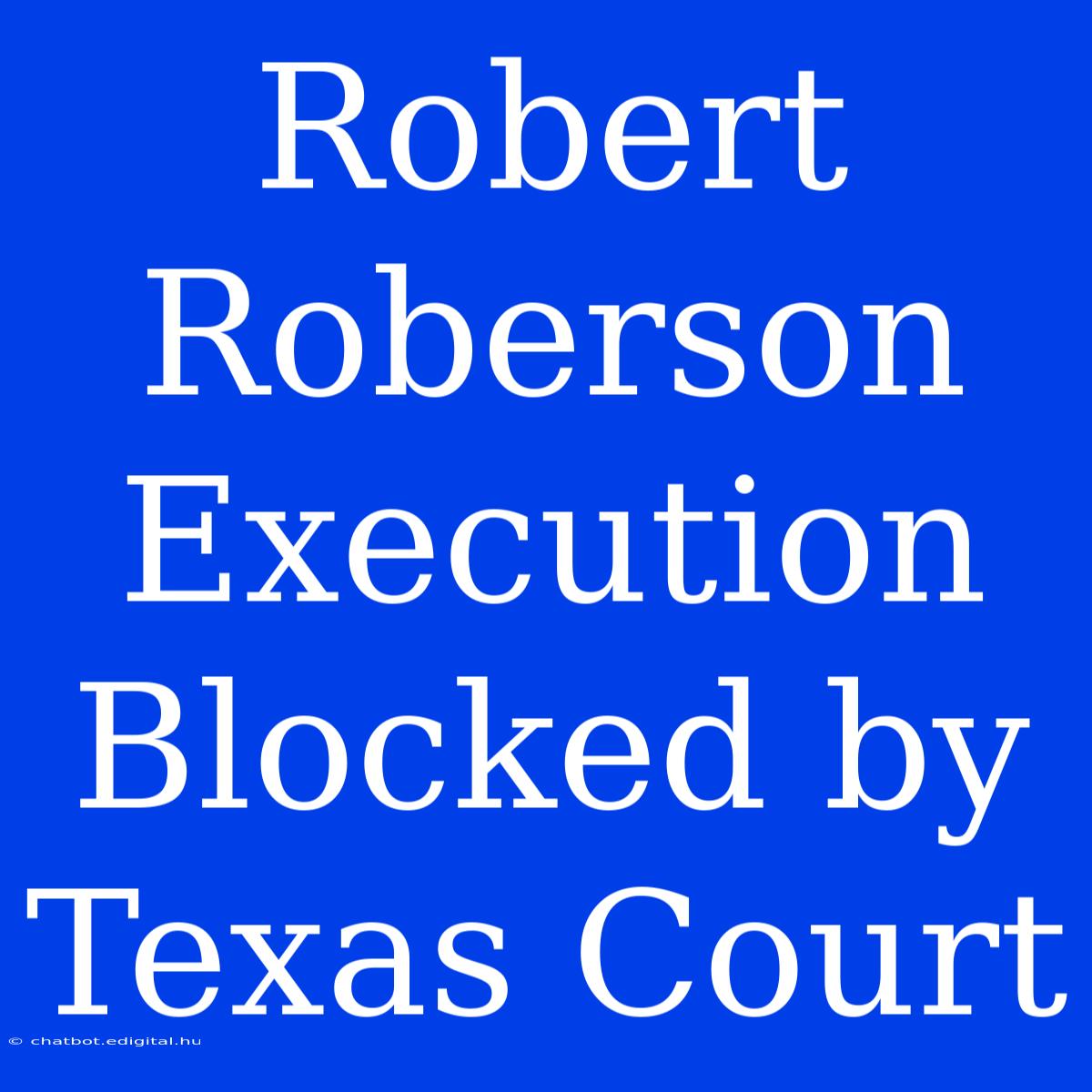Texas Court Blocks Execution of Robert Roberson: A Glimpse into the Complexities of Capital Punishment
Can a death sentence be carried out when questions of mental competency remain? The recent decision by a Texas court to block the execution of Robert Roberson throws light on the ongoing debate surrounding capital punishment and the crucial issue of mental competency in death row inmates.
Editor Note: This article delves into the complexities of Robert Roberson's case, examining the legal arguments surrounding his execution and the broader implications for capital punishment.
This case highlights the profound ethical and legal challenges surrounding the death penalty. Questions of mental competency and the potential for executing someone who may not fully understand the gravity of their situation raise serious concerns.
Analysis: We've carefully analyzed the court documents, news reports, and expert opinions to present a comprehensive overview of the Roberson case. This analysis aims to provide clarity on the legal arguments, the ethical considerations, and the potential ramifications for future capital punishment cases.
Key Takeaways of Robert Roberson's case:
| Takeaway | Details |
|---|---|
| Court's decision to block the execution | The Texas Court of Criminal Appeals issued a stay of execution based on concerns about Roberson's mental competency and the possibility of him not understanding the nature of his death sentence. This decision underscores the importance of ensuring fairness and due process in capital punishment cases. |
| Questions of mental competency | Roberson's lawyers argued that he suffers from severe mental illness and cannot rationally understand the proceedings against him, raising significant concerns about his ability to participate in his defense. The court's decision acknowledges the potential impact of mental illness on the fairness of a capital punishment case. |
| Ongoing legal battle | The decision to block the execution is likely to lead to further legal battles as both sides prepare their arguments and present evidence regarding Roberson's mental state. The outcome of this legal battle will have significant implications for the application of the death penalty in Texas and beyond. |
The Robert Roberson Case
Mental Competency
At the heart of the controversy surrounding Robert Roberson's execution is the issue of his mental competency. His lawyers argued that he suffers from severe mental illness, possibly schizophrenia, and cannot fully understand the proceedings against him. This raises fundamental concerns about his ability to assist in his defense and to comprehend the implications of a death sentence. The court's decision to block the execution suggests that it recognized these concerns and deemed it necessary to delve further into the question of Roberson's mental state.
Fairness and Due Process
The court's decision to stay the execution underscores the importance of fairness and due process in capital punishment cases. The legal system strives to ensure that those facing the ultimate penalty understand the proceedings against them and have a meaningful opportunity to defend themselves. Concerns about Roberson's mental competency raise questions about whether this principle was adequately upheld in his case.
The Broader Implications
The Roberson case serves as a stark reminder of the complexities surrounding capital punishment. Questions of mental competency, the potential for wrongful convictions, and the ethical considerations surrounding the death penalty continue to fuel debates across the nation. The legal system's response to these issues will continue to be shaped by cases like Roberson's, prompting careful examination of the procedures surrounding capital punishment and the fundamental rights of those facing the ultimate penalty.
FAQ
Q: Why is Robert Roberson's case important?
A: The case highlights the crucial importance of ensuring that individuals facing capital punishment are mentally competent and understand the gravity of their situation. It also raises questions about the fairness and ethical implications of the death penalty in the face of mental illness.
Q: What are the arguments for and against the death penalty?
A: Arguments in favor of the death penalty often cite retribution for heinous crimes, deterrence of future violence, and justice for victims. Opposing arguments often emphasize the potential for wrongful convictions, the high costs of capital punishment, the lack of evidence for its deterrent effect, and the ethical issues surrounding the taking of human life by the state.
Q: What role does mental competency play in capital punishment cases?
A: Mental competency is crucial in ensuring fairness and due process. Individuals facing capital punishment must be mentally capable of understanding the charges against them, assisting in their defense, and comprehending the potential consequences of a death sentence.
Q: What are the potential consequences of the Roberson case?
A: This case could lead to further legal challenges regarding mental competency in capital punishment cases. It may also trigger a re-evaluation of the death penalty's application, particularly in cases where mental illness is a factor.
Tips
- Stay informed: Keep abreast of developments in the Roberson case and other cases related to capital punishment and mental competency.
- Engage in thoughtful discussion: Participate in respectful dialogue about the ethical and legal implications of the death penalty.
- Support organizations working to address mental illness and advocate for fairness in the justice system.
Summary
The Texas court's decision to block Robert Roberson's execution underscores the complexities surrounding capital punishment. Concerns about mental competency, the potential for wrongful convictions, and the ethical implications of the death penalty continue to raise critical questions about the fairness and effectiveness of this practice.
Closing Message:
The Roberson case highlights the need for ongoing dialogue and critical examination of capital punishment in the context of mental illness. As our society navigates these complex issues, it is imperative that we prioritize fairness, due process, and the fundamental human rights of all individuals, regardless of their circumstances.

